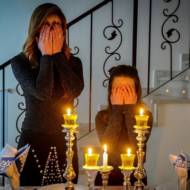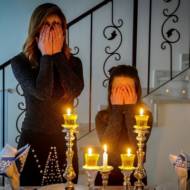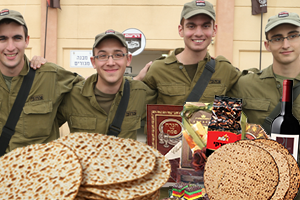
Israeli Kids Test Shabbat-in-Space with Candle Experiment

United with Israel’s rabbinic director weighs in on lighting Shabbat candles in zero-gravity, discussing the unique requirements and opportunities posed by Israeli astronaut Eytan Stibbe’s groundbreaking holiday in outer space.
By Pesach Benson, United With Israel
Fire doesn’t burn in zero-gravity the way it does on Earth, so how will Israeli astronaut Eytan Stibbe light Shabbat candles aboard the International Space Station?
That’s the question Stibbe is turning into a very special and creative lesson for the fourth grade class of Jerusalem’s Dibrot Moshe School on Wednesday. The students participated in special math and science classes given by the Baba-Da organization and then won a contest organized by the the Rakia Mission and the Ramon Foundation, which organized Stibbe’s eight-day mission aboard the space station, the Jerusalem Post reported.
By winning the contest, Stibbe will give the fourth graders a lesson called “Lighting Shabbat Candles in Space – the Halacha and Science Challenge.”
In the absence of gravity, hot air expands, but does not move up, which is what creates the vertical flickering flames associated with Shabbat candle. The diffusion of oxygen yields smaller, sluggish and spherical flames.
However, flames in zero-gravity can sometimes survive for longer periods of time, and even continue burning after appearing to be extinguished.
Scientists learning how fire behaves in zero-gravity hope to apply the discoveries in practical ways such as more efficient combustion engines and how fire might be used on other planets with different gravitational fields — not to mention make space flight safer.
“NASA did about 200 experiments of lighting candles in space,” Baba-Da founder Michal Ivgi told the Post. “It turns out that in space the flame looks different; its small, round and blue. Although the combustion is slower, they have not been able to burn for more than 20 minutes in space.”
Baba-Da is a non-profit organization offering first- through ninth-grade students an experiential curriculum in the fields of science, technology, engineering and math.
Shabbat Candles on the Space Station
“Lighting Shabbat candles is very, very important,” said Rabbi Ari Enkin, United with Israel’s rabbinic director.
“It comes from the Talmud and it’s in the code of Jewish law. It honors the Shabbat and it makes the evening meal more delightful. It’s a very big mitzvah, a very big obligation.”
Why two candles?
“We light two candles minimum to remember the two statements regarding the observance of Shabbat. One is “Zachor et Yom HaShabbat l’kadsho,” (remember the Sabbath day to keep it holy) which appears in the first set of the Ten Commandments. In the second set of the Ten Commandments, we have “Shamor et Yom HaShabbat l’kadsho,” (guard the Sabbath day to keep it holy),” Rabbi Enkin said.
“In addition to the two candles, many women have the custom to add a candle for every child they have.”
Is it possible that because he’s in outer space, Stibbe isn’t obligated to light candles at all?
“Shabbat has to be observed in outer space. Therefore candles would have to be lit if it’s possible in outer space,” he said. “If it’s not possible, there would be an automatic exemption.”
In a previous discussion about Stibbe’s zero-gravity Passover seder, Rabbi Enkin said there was a rabbinic dispute whether Stibbe should light candles and pray based on the time in Israel, where he lives, or the time in Florida, where he left Earth. Ivgi told the Post that Stibbe would light on Florida time.
How long do the lights need to remain lit?
“The candles need to remain lit at least past dark. Again, they’re lit before sunset. They must burn a very minimum into dark. Preferably, they should stay lit for the duration of the Friday night meal,” said the rabbi.
Isn’t it enough for Stibbe to light with light bulbs, like many people in hospitals do?
“There are many rabbinic authorities that allow lighting of the Shabbat candles with the old fashioned light bulbs. And many authorities say that even the blessing that is usually said over the candles can be said over the light bulbs,” Rabbi Enkin said.
“But not the fluorescent lights, which are more common, but the old fashioned incandescent bulbs can be used for Shabbat and havdala if need be.”
The questions raised by Stibbe’s candle-lighting aboard the space stations may not be solved for years. Perhaps the fourth graders and other Israeli students whose breakthrough experiments Stibbe is running will one day find the answers within the laws of science and Shabbat.
Said Rabbi Enkin, “Stibbe teaches us that whether we’re wandering 40 years in the desert or wandering 400 km above the Earth, Judaism comes with us wherever we go.”
Send Passover Packages to Needy Israeli Soldiers – Bring Them Joy!
We are honored to thank the young men and women of the IDF who risk their lives every day to protect the freedom of the citizens of Israel.
Join us in sending Passover food packages (and personal notes) to Israeli soldiers and their families
Many soldiers spend the Passover holiday with needy families back home. The soldiers greatly appreciate your love and concern. Bring them Passover joy!
CLICK HERE TO SEND YOUR PACKAGE AND NOTE TO ISRAELI SOLDIERS!
The post Israeli Kids Test Shabbat-in-Space with Candle Experiment first appeared on United with Israel.
United with Israel
